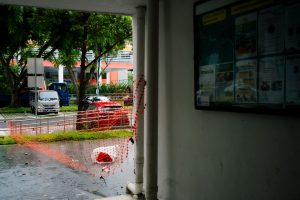Top image: Zachary Tang / RICE File Photo
On February 18, the 2022 budget will be announced in parliament. While members of the public and various organisations will be able to submit their views on the budget after it is presented, we wanted to hear from non-government organisations on what issues they are urging the government to consider for the announcement.
AWARE – Gender Equality
What issues does AWARE recommend the government take into consideration for the 2022 budget?
Since 2011, AWARE has made submissions to Singapore’s National Budget 11 times. These recommendations were based on research and our own direct experience working with vulnerable populations in Singapore, including family caregivers and low-income women.
In recent years, much of our focus has been on female caregivers to the elderly, a demographic that will only grow in years to come as our population ages. Recommendations around eldercare that have not yet been implemented include:
1. The legislated right for employees to request flexible work arrangements.
2. The introduction of six days of paid eldercare leave so that working caregivers do not have to use up their annual or medical leave.
3. The introduction of a Caregiver Support Grant with cash and CPF components.
4. Extension of the Pioneer Generation Package (PGP) to all people reaching 65 years of age, to provide universal healthcare that is affordable for seniors and their family members
Other past AWARE recommendations for the budget involve childcare, such as providing free childcare to children from low-income families regardless of their mother’s employment status and equalising maternity and paternity leave to promote equal sharing of responsibilities. We also recommend migrant spouses and LTVP/+ holders be granted the automatic right to work and the right to be self-employed.
If you had to pick one issue to prioritise, what would this be?
An upcoming piece of legislation that we believe to be immensely important is the anti-discrimination legislation that the Prime Minister announced at last year’s National Day Rally.
We strongly urge the government to make this anti-discrimination legislation comprehensive, in that it should forbid employers to discriminate not just on the basis of gender, race or ethnicity, religion, disability, age, marital status and family responsibilities, but also on the basis of sexual orientation and gender identity.
Currently, the Tripartite Guidelines on Fair Employment Practices, upon which the law is to be based, do not protect against discrimination for the latter. For this budget, we would also like to see workplace harassment categorised as a form of discrimination.
Furthermore, the legislation should clearly illustrate, in accessible language, different types of discriminatory behaviour. It should also ensure that discrimination victims and witnesses are adequately protected from retaliation, which is a severe problem and a barrier to reporting for many (our recent report on workplace sexual harassment, for example, found that about 30% of victim-survivors faced retaliation after reporting their harassment).
The Greenhouse Community Services – Addiction recovery for marginalised communities
What issue does your organisation address, and what challenges have you faced?
The Greenhouse is a substance use recovery centre for trauma survivors. We provide holistic and integrated care to those who wish to stop using drugs or alcohol in a safe and supportive environment.
It is important to recognise that the pandemic has created a very real mental health burden. And that this affects marginalised and vulnerable communities, who experience more stigma, bullying and discrimination in a very disproportionate fashion.
The circuit breakers exacerbated the sense of isolation many of our beneficiaries were already experiencing. This led to an increase in the number of people seeking help at our centre, even as we continue to support those currently in care. On top of this, fundraising efforts have been disrupted by safe management measures.
Because many people fail to understand drug or alcohol addiction as a mental health issue, often caused by adverse childhood experiences, they are rarely empathetic to the suffering of our beneficiaries, which makes fundraising a constant challenge.
We are very grateful to have been part of the Tote Board Enhanced Fundraising Programme, which made 2021 much easier for us to manage. We hope for more such initiatives in 2022 to help us tide through this incredibly challenging period.
What challenges will you be tackling over the next year?
As a volunteer-run welfare organisation, we are blessed to have a growing pool of counsellors who are dedicated to our cause of helping more people recover from trauma and addiction. This, however, requires more full-time staff to manage them.
We are also facing space constraints, which significantly limits our ability to provide training, individual counselling and group therapy sessions while following safe management measures. Our focus this year is to meet funding, manpower and venue challenges so we can continue providing safe and effective care to trauma survivors that wish to heal and outgrow their drug or alcohol dependence.
If you had to pick one issue to prioritise, what would this be?
Securing funding is our most immediate challenge and what we will be focusing on. We have enough resources to operate at current capacity, but not enough to meet the growing demand for our services or move to larger premises.
This means that we might have to stop taking in new clients to properly serve our current clients, which is a very worrying situation. We firmly believe that anyone who wishes to recover from trauma and addiction deserves competent and compassionate care, regardless of our beliefs about them or addiction.
Limitless SG — Youth mental health
What issue does your organisation address, and what are your current challenges?
Our organisation provides subsidised or pro-bono therapy for youths struggling with mental health, and providing this service is the most difficult to fund. One of the reasons for this is that we often get companies willing to send volunteers to us rather than donating to us directly.
While we do have funding from the government, youth mental health is still a relatively new sector, and therefore, the rollout of funding is slow.
In the future, we’ll continue to provide safe and professional mental health therapy for youths and continue to focus on making help-seeking easy and barrier-free for young individuals. We’re also going to double down our focus on community building for youths who want support for their mental health through our discord channel SAFEHOUSE and our outreach through social media.
If you had to pick one issue in this budget to prioritise, what would this be?
The number one issue we urge the government to prioritise in this budget is youth mental health. It’s the most significant rising issue that youths face collectively, with potentially tragic consequences if left untreated. Mental illness is often invisible, debilitating, and can take away a young person’s ability to function in relationships, school, and work. Being mentally unwell during your formative years can take away future opportunities, and even in some cases, cost lives.
20% of the youths who reach out to us struggle with suicidal ideation. With each of our therapists on staff supporting about 80-90 youths a year, helping us to financially support just one more therapist on staff could mean, in the best-case scenario, 16 young people being prevented from taking their lives, with many more going on to recover and live their best lives.
Project X – Sex worker rights
What issue does your organisation address, and what challenges have you faced?
As a minority group that is marginalised and includes individuals from minority backgrounds, sex workers’ needs are often overlooked. For example, sex workers who have a physical disability and are gender-diverse; or sex workers who are single mothers and non-citizens.
As such, it has been challenging to find sustainable sources of funding for programs to support a wide array of sex workers looking to leave the industry, mental health programs for sex workers, and programmes to build the capacity of sex worker peer educators.
Many funding sources often come with narrow parameters as to who qualifies, and often these parameters do not come from an intersectional or inclusive lens.
If you had to pick one issue to prioritise, what would this be?
Mental health is currently one of the most pressing issues among sex workers and society in general. While we have focused on sexual health for a long time and have built up our capacity significantly in that aspect, this year, we hope to similarly build up our ability to render professional peer mental health support to the community.
In an environment where sex workers do not have equitable access to social-welfare services due to criminalisation and stigma—which is the root cause of a lot of their mental health struggles—we hope to be a safe space for them to seek support and healing.
Just Dabao – Food Waste Redistribution (Social Enterprise)
What issue does your organisation address, and what challenges have you faced?
For us, the critical focus is changing the stigma surrounding surplus food. Consumers instantly associate surplus food with bad quality food. However, it is perfectly edible and indistinguishable from regular food. Hence, educating consumers that it is perfectly edible and tastes the same takes time and effort. We’ve been actively advocating for people to make sustainable choices through positive reinforcement.
Food waste is caused by bad practices and broken systems which have sadly become the norm and the simpler way to go. Furthermore, there’s a complacency towards the supply of food which is ingrained deeply in the current society.
Having said that, our government is great at putting initiatives into action—but so far, the root cause of the issue is not fully addressed or taken seriously. Hence, it would be great if the government, through the budget, can start working together with social enterprises to create policies on future food waste policies measures.
As we work towards change, we still encounter the misconception that social enterprises are not as profitable as a typical startup. Hence, having to highlight the balance between P&L (profit and loss) and impact metrics to investors can sometimes require more time.
If you had to pick one issue to prioritise, what would this be?
Just Dabao believes in uplifting all communities and making an impact. However, we can’t do this alone. Although social enterprises make money, the scalability of one requires many levels of support and yes, funding too. Nevertheless, the government can partner more actively with social enterprises through programs and collaborations. For example, by opening doors to bigger corporations who are interested in getting a headstart into Corporate Social Responsibility practices.
Ultimately, it is about the outreach and credibility more than the funs, as those can help social enterprises achieve their vision.







